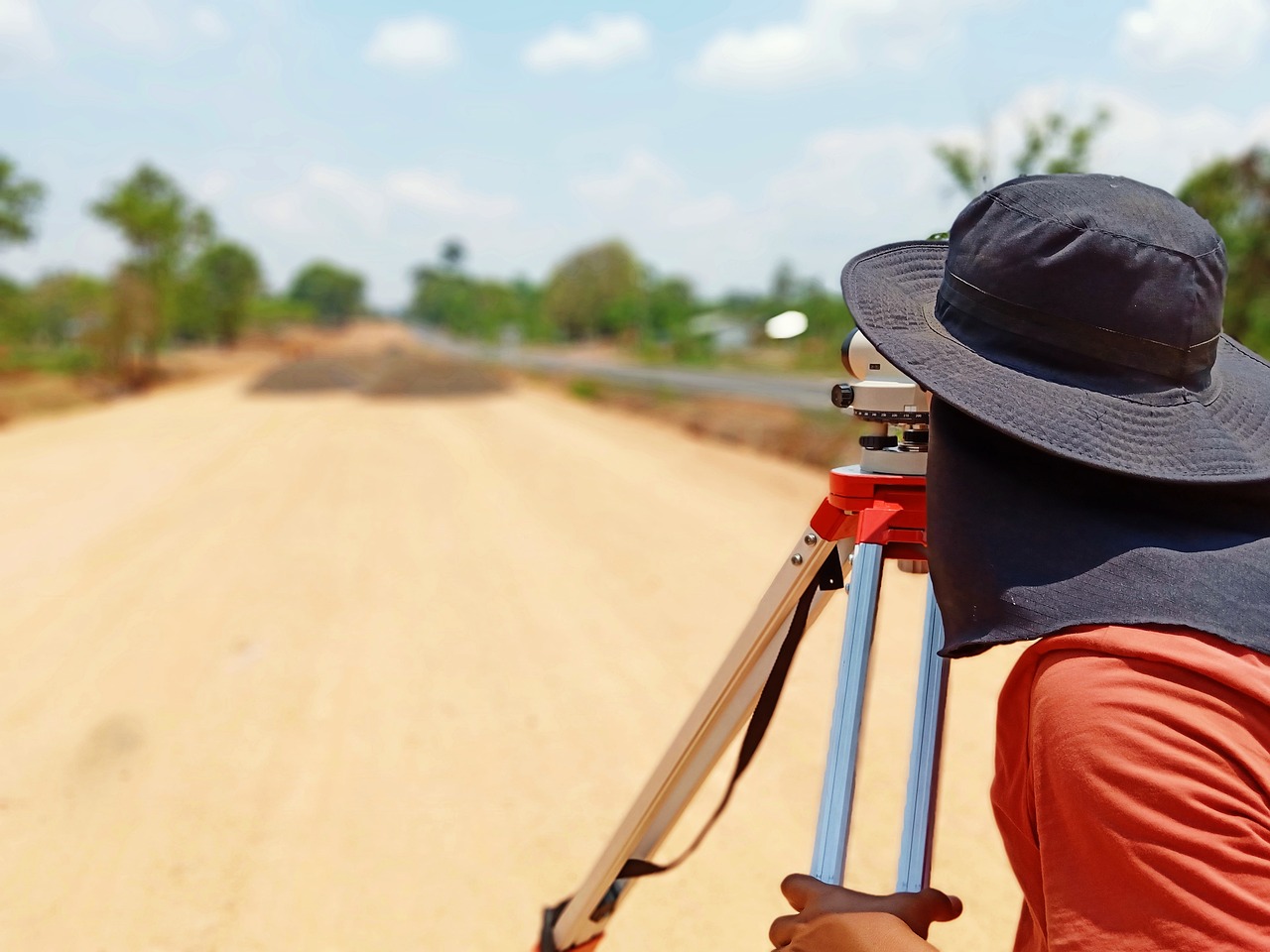Are you looking for a reliable land surveyor but need help figuring out where to start? In today’s article, we will unveil the secrets to finding the best land surveyor near you. Whether you’re a homeowner, a property developer, or a construction professional, having accurate and precise land surveying is essential for any project.
Finding a reputable land surveyor can be daunting, especially with so many options available. But don’t worry—we’ve got you covered. In this comprehensive guide, we will discuss the key factors to consider when selecting a land surveyor, including qualifications, experience, and reputation.
We will also provide valuable tips and insights on assessing their past projects, understanding their pricing structure, and ensuring they use the latest technology and techniques for accurate land measurements.
By the end of this guide, you will have all the knowledge and tools you need to make an informed decision and find the best land surveyor near you. So, let’s get started on your journey to successful land surveying!
The Importance of Hiring a Land Surveyor
Land surveying is crucial in various aspects of real estate and construction projects. It provides accurate measurements and data for property boundaries, land development, and construction planning. A land surveyor is a trained professional specializing in measuring and mapping the land, ensuring that all necessary legal and technical requirements are met.
One primary reason for hiring a land surveyor is to establish property boundaries. Knowing the exact boundaries is essential when buying or selling a property and to avoid future legal disputes. A land surveyor will conduct a boundary survey to identify and mark the property lines, corners, and encroachments.
Additionally, land surveyors play a crucial role in land development projects. Whether you’re planning to subdivide a property or construct a new building, a land surveyor will provide the necessary data and measurements to ensure compliance with local regulations and zoning laws. They will determine the land’s topography, elevation, and contours, allowing architects and engineers to design and plan accordingly.
In construction projects, land surveyors are responsible for staking out the proposed structures and ensuring they are placed correctly according to the plans. They also monitor the construction process to ensure the building is constructed within the specified boundaries and elevations. This ensures the project is carried out accurately and reduces the risk of costly mistakes or legal complications.
What Does a Land Surveyor Do
A land surveyor is a trained professional who specializes in measuring and mapping the land. They use various tools and technologies to gather data and provide accurate measurements and descriptions of the land. Here are some of the key tasks that a land surveyor performs:
- Boundary Surveys: As mentioned earlier, boundary surveys are conducted to establish property lines and corners. This involves researching historical records, conducting field measurements, and creating a detailed map or survey report that clearly defines the property boundaries.
- Topographic Surveys: Topographic surveys involve mapping the natural and man-made features of the land. This includes contours, elevations, trees, buildings, roads, and other physical features. Topographic surveys are essential for land development projects, as they provide a clear understanding of the existing conditions of the land.
- Construction Surveys: Construction surveys are conducted during the construction phase of a project. Land surveyors stake out the proposed structures, ensuring that they are being built in the correct location and alignment according to the plans. They also monitor the construction process to ensure accuracy and compliance with the surveying specifications.
- Subdivision Surveys: Subdivision surveys are conducted when a property is divided into multiple lots or parcels. Land surveyors determine the boundaries of each lot, create new legal descriptions, and establish any necessary easements or access rights.
- Floodplain Surveys: In areas prone to flooding, land surveyors are responsible for conducting floodplain surveys. These surveys help determine the flood risk and establish the base flood elevation, which is vital for obtaining flood insurance and complying with local regulations.
These are just a few examples of the tasks that land surveyors perform. Their expertise and knowledge are invaluable in ensuring that land is accurately measured, boundaries are established, and projects are carried out according to the specifications.
Types of Land Surveying Services
Land surveying services can vary depending on the type of project and the specific requirements. Here are some of the common types of land surveying services provided by professionals:
- Boundary Surveys: Boundary surveys are conducted to determine and mark the legal boundaries of a property. This involves researching historical records, conducting field measurements, and creating a detailed map or survey report.
- Topographic Surveys: Topographic surveys involve mapping the natural and man-made features of the land. This includes contours, elevations, trees, buildings, roads, and other physical features. Topographic surveys are essential for land development projects, as they provide a clear understanding of the existing conditions of the land.
- Construction Surveys: Construction surveys are conducted during the construction phase of a project. Land surveyors stake out the proposed structures, ensuring that they are being built in the correct location and alignment according to the plans. They also monitor the construction process to ensure accuracy and compliance with the surveying specifications.
- Subdivision Surveys: Subdivision surveys are conducted when a property is divided into multiple lots or parcels. Land surveyors determine the boundaries of each lot, create new legal descriptions, and establish any necessary easements or access rights.
- Hydrographic Surveys: Hydrographic surveys are conducted in bodies of water, such as lakes, rivers, or oceans. They involve mapping the depth, contours, and features of the underwater terrain. Hydrographic surveys are essential for navigation, dredging, and understanding the impact of water bodies on adjacent land.
- Geodetic Surveys: Geodetic surveys involve measuring large areas of land to establish precise horizontal and vertical positions. These surveys are used for mapping, satellite positioning, and geospatial data collection. Geodetic surveys often require specialized equipment and expertise.
These are just a few examples of the types of land surveying services available. The specific needs of your project will determine the type of surveying services required.
Qualities to Look for in a Land Surveyor
When it comes to selecting a land surveyor, there are several qualities to consider to ensure that you’re hiring a qualified and reliable professional. Here are some key qualities to look for:
- Qualifications and Licenses: It is essential to verify that the land surveyor you’re considering is qualified and licensed to practice in your state or country. Land surveyors typically have a degree in surveying or a related field and are registered with the appropriate professional regulatory bodies.
- Experience and Expertise: Land surveying is a skill that develops with experience. Look for a surveyor who has several years of experience in the field and has worked on projects similar to yours. Experienced surveyors are more likely to have encountered a variety of challenges and can provide valuable insights and solutions.
- Reputation and References: A good land surveyor will have a solid reputation in the industry. Ask for references and check online reviews or testimonials from past clients. This will give you an idea of their professionalism, reliability, and the quality of their work.
- Technology and Equipment: Land surveying has evolved significantly with the advent of new technologies and equipment. A good surveyor should be up-to-date with the latest tools and techniques for accurate measurements. Inquire about the equipment they use and whether they have access to advanced technologies such as GPS or laser scanning.
- Communication and Customer Service: Effective communication is crucial when working with a land surveyor. They should be able to clearly explain the surveying process, answer any questions you may have, and provide regular updates on the progress of the project. Look for a surveyor who is responsive, attentive to your needs, and maintains open lines of communication.
By considering these qualities, you can ensure that you’re hiring a land surveyor who is qualified, experienced, and capable of delivering accurate and reliable results for your project.
Factors to Consider When Choosing a Land Surveyor
Choosing the right land surveyor for your project requires careful consideration of several factors. Here are some key factors to keep in mind:
- Project Requirements: Different projects may have specific surveying requirements. Determine the scope and objectives of your project to identify the type of surveying services you need. This will help you find a surveyor who specializes in your specific requirements.
- Location and Expertise: Consider the location of your project and look for a surveyor who is familiar with the area. Local surveyors often have a better understanding of the regional regulations, environmental conditions, and potential challenges that may arise. Their local expertise can be invaluable in ensuring accurate and efficient surveying.
- Pricing Structure: Surveying fees can vary depending on the complexity and size of the project. Obtain quotes from multiple surveyors and compare their pricing structures. Be cautious of significantly low prices, as they may indicate a lack of experience or the use of outdated equipment. Choose a surveyor who offers a reasonable and transparent pricing structure.
- Insurance and Liability Coverage: Accidents and errors can occur during the surveying process. Ensure that the surveyor you choose has adequate insurance coverage to protect against potential liabilities. This will give you peace of mind knowing that you’re protected in case of any unforeseen circumstances.
- Timelines and Availability: Discuss the expected timelines for your project and ensure that the surveyor can accommodate your schedule. Delays in surveying can have a cascading effect on the overall project timeline. Choose a surveyor who can commit to your project and has the availability to meet your deadlines.
By considering these factors, you can narrow down your options and select a land surveyor who meets your specific requirements and preferences.
How to Find a Land Surveyor Near You
Now that you know what to look for in a land surveyor, the next step is to find one near you. Here are some effective ways to locate a qualified land surveyor:
- Referrals: Ask for recommendations from friends, colleagues, or professionals in the real estate or construction industry. Personal referrals can provide valuable insights into the quality of a surveyor’s work and their overall professionalism.
- Professional Associations: Check with local or national professional associations for land surveyors. These associations often have directories or referral services that can help you find qualified surveyors in your area. Examples of such associations include the National Society of Professional Surveyors (NSPS) in the United States or the Royal Institution of Chartered Surveyors (RICS) in the United Kingdom.
- Online Directories: Utilize online directories or search engines to find land surveyors near you. Websites like the NSPS directory or Google Maps can provide a list of surveyors in your area along with their contact information and customer reviews.
- Local Government Agencies: Contact your local planning or zoning department for recommendations. They often work closely with land surveyors and can provide you with a list of qualified professionals.
- Social Media and Online Platforms: Join online communities or forums related to real estate or construction and ask for recommendations. Social media platforms like LinkedIn or professional online platforms like Houzz can connect you with industry professionals who can recommend reliable surveyors.
When conducting your search, consider multiple options and gather as much information as possible. This will allow you to compare surveyors and make an informed decision based on your specific needs.
Questions to Ask When Interviewing a Land Surveyor
Once you have shortlisted a few potential surveyors, it’s important to interview them to assess their qualifications and suitability for your project. Here are some important questions to ask during the interview:
- Are you licensed and registered with the appropriate regulatory body?
- What is your experience in conducting surveys similar to mine?
- Can you provide references from past clients or examples of your previous work?
- What technology and equipment do you use for surveying?
- What is your pricing structure and what is included in the fees?
- Will you be personally involved in the surveying process or will it be delegated to other team members?
- What is your estimated timeline for completing the survey?
- How do you handle potential challenges or unexpected circumstances during the surveying process?
- Do you have liability insurance coverage?
- How do you communicate with clients throughout the project?
By asking these questions, you can gain valuable insights into the surveyor’s qualifications, experience, and approach to their work. Their answers will help you assess their suitability for your project and make an informed decision.
Tips for Working with a Land Surveyor
Once you have selected a land surveyor, it’s important to establish a good working relationship to ensure a smooth and successful surveying process. Here are some tips for working effectively with your surveyor:
- Clearly Communicate Your Objectives: Clearly communicate your project objectives, requirements, and any specific concerns or constraints you may have. This will help the surveyor understand your expectations and tailor their approach accordingly.
- Provide Access and Information: Ensure that the surveyor has access to the property or site and any relevant documents or records. This will allow them to conduct a thorough survey and gather accurate data.
- Maintain Open Communication: Establish a clear line of communication with the surveyor and maintain regular contact throughout the project. This will allow you to stay updated on the progress and address any questions or concerns promptly.
- Trust the Surveyor’s Expertise: Remember that you hired a professional surveyor for their expertise. Trust their judgment and recommendations, as they are trained to provide accurate measurements and assessments of the land.
- Be Prepared for Unexpected Challenges: Surveying can sometimes uncover unexpected challenges or complexities. Be prepared to adapt to any unforeseen circumstances and work collaboratively with the surveyor to find solutions.
By following these tips, you can foster a productive working relationship with your land surveyor and ensure the successful completion of your project.
Common Misconceptions About Land Surveying
Despite the importance of land surveying, there are several common misconceptions surrounding the profession. Let’s debunk some of these misconceptions:
- “I don’t need a land surveyor because I have a copy of the property deed.” While property deeds provide legal descriptions, they may not accurately represent the physical boundaries of the property. Only a land surveyor can provide accurate measurements and identify any encroachments or discrepancies.
- “Land surveying is only necessary for large-scale projects.” Land surveying is essential for projects of all sizes, from small residential properties to large-scale developments. Accurate measurements and boundary identification are crucial for any construction or real estate project.
- “All land surveyors provide the same level of quality and accuracy.” The quality and accuracy of surveying services can vary depending on the surveyor’s qualifications, experience, and equipment. It’s important to do your research and select a qualified and reputable surveyor for your project.
- “Land surveying is a one-time process.” Land surveying may be required at different stages of a project, from initial planning to construction and property division. It’s important to consult with a surveyor at the appropriate stages to ensure accurate and up-to-date data.


